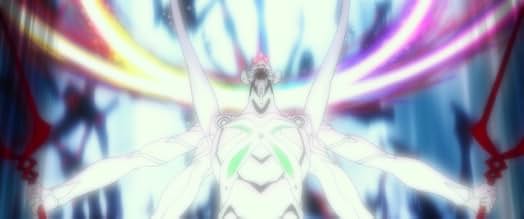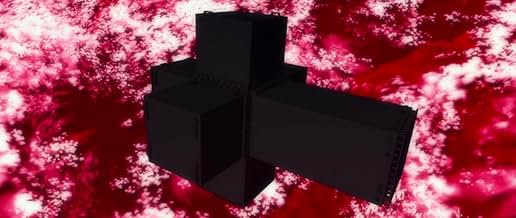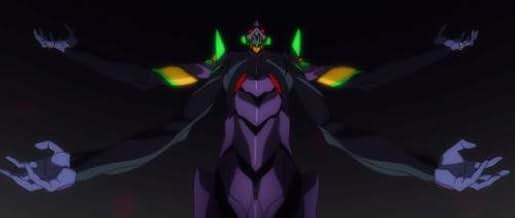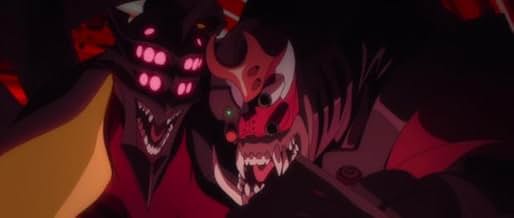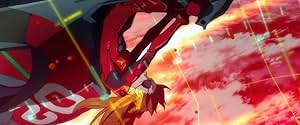Evangelion 3.33: Você (Não) Pode Refazer
Título original: Evangelion Shin Gekijôban: Kyu
AVALIAÇÃO DA IMDb
6,9/10
21 mil
SUA AVALIAÇÃO
Shinji acorda após 14 anos a bordo da AAA Wunder, que pertence a uma organização anti-NERV fundada por ex-membros da NERV. Ele descobre que salvar Rei desencadeou o Quase Terceiro Impacto, q... Ler tudoShinji acorda após 14 anos a bordo da AAA Wunder, que pertence a uma organização anti-NERV fundada por ex-membros da NERV. Ele descobre que salvar Rei desencadeou o Quase Terceiro Impacto, que causou danos catastróficos na Terra.Shinji acorda após 14 anos a bordo da AAA Wunder, que pertence a uma organização anti-NERV fundada por ex-membros da NERV. Ele descobre que salvar Rei desencadeou o Quase Terceiro Impacto, que causou danos catastróficos na Terra.
- Prêmios
- 2 indicações no total
Megumi Ogata
- Shinji Ikari
- (narração)
Megumi Hayashibara
- Rei Ayanami (kashou)
- (narração)
- …
Yûko Miyamura
- Asuka Langley Shikinami
- (narração)
Maaya Sakamoto
- Mari Illustrious Makinami
- (narração)
Kotono Mitsuishi
- Misato Katsuragi
- (narração)
Akira Ishida
- Kaworu Nagisa
- (narração)
Yuriko Yamaguchi
- Ritsuko Akagi
- (narração)
Fumihiko Tachiki
- Gendo Ikari
- (narração)
Motomu Kiyokawa
- Kozo Fuyutsuki
- (narração)
Takehito Koyasu
- Shigeru Aoba
- (narração)
Hiro Yûki
- Makoto Hyuga
- (narração)
Miki Nagasawa
- Maya Ibuki
- (narração)
Miyuki Sawashiro
- Sakura Suzuhara
- (narração)
Akio Ôtsuka
- Kouji Takao
- (narração)
Sayaka Ôhara
- Sumire Nagara
- (narração)
Anri Katsu
- Hideki Tama
- (narração)
Mariya Ise
- Midori Kitakami
- (narração)
Mugihito
- Keel Lorenz
- (narração)
Avaliações em destaque
Finally new material after years of remakes and recycled material and reshuffled scenes.
It is glorious to behold!
But, at the same time, it was a whole lot of setup and build up for the final part in the series. So, it didn't have as much bang as I would have liked.
Overall, it's very true to what came before, and it's nice to see these characters doing something new even if it was a bit of a tease to wait for the final movie.
It is glorious to behold!
But, at the same time, it was a whole lot of setup and build up for the final part in the series. So, it didn't have as much bang as I would have liked.
Overall, it's very true to what came before, and it's nice to see these characters doing something new even if it was a bit of a tease to wait for the final movie.
14 years after the Third Impact, Shinji Ikari awakens in an unfamiliar world where he's blamed for the destroyed world. Misato Katsuragi now leads an organization, Wille, along with several other former Nerv members including Asuka in a battle against Nerv and Shinji's father Gendo. When Shinji is rescued from Wille by Rei (or what appears to be Rei) Shinji is taken to the ruins of Nerv headquarters where Gendo is still working with Rei and Kaworu Nagisa on plans to bring about Human Instrumentality.
Evangelion: 3.0 You Can (Not) Redo, the third in Hideaki Anno's Rebuild of Evangelion film series, is probably the most ambitious of the series yet with the moviemaking a fourteen year time jump and creating a desolate red landscape with the characters we've come to know unrecognizable in the time since we've last seen them. While certainly ambitious, I find myself at odds with myself over the end product. On the one hand the movie goes into a bold direction the series has not yet traversed, but on the other hand I can't really say it does it well.
When the movie starts, we're thrown into an elaborate fight scene in Earth orbit with Asuka and another Eva pilot, Mari (who was introduced in the previous film, but factored so little into the plot I didn't even mention her in the previous review) fighting against an unknown enemy while escorting a package back to Earth. In terms of opening sequences it's a well-choregraphed sequence that's unlike any of the other fight sequences we've seen in the TV series or other Rebuild films so it gets off on the right foot....and then Shinji comes into the story. When Shinji comes into the story not only are we thrown into an unfamiliar environment with Misato Katsuragi piloting a ship called the "Wunder" now carrying a hardened edge and telling Shinji to "do nothing" which leads into a lengthy fight sequence against more nameless enemies before we're given very vague exposition on the "Third Impact" Shinji caused in the last movie that completely ignores the post credit scene where Kaworu stopped the Third Impact which leads to lingering questions that are never really answered over the course of the film. Even the time jump feels like this movie is detached from the other two films and dangling plot threads are just brushed by the wayside.
Despite the many missteps taken by Evangelion 3.0, I do think it does some things well. Shinji's relationship with Kaworu Nagisa was a large point of praise in episode 24 of the TV series, and the film expands on that relationship here giving us more time with Kaworu and Shinji in some truly amazing scenes such as the scenes of the two of them playing pion together or watching the stars. It's unfortunate that there aren't more of these types of character moments with other characters and instead the movie often feels like it's ambling along in search of a direction. Despite being the shortest of the Rebuild of Evangelion film series, Evangelion 3.0 feels like the longest because there's a barrier erected between the audience and characters that never really gives way through the entirety of the running time. The cold indifference with which Shinji is treated by Wille coupled with Shinji's regression to a state of helplessness feels like it's there simply to drive Shinji to Gendo and Nerv because it needs Shinji to bring about the Fourth Impact. Why exactly? I'm not sure, granted Gendo says it's to reunite with his wife Yui, but given the state of the post Third Impact world a Fourth Impact feels like it'd be putting a hat on a hat at this point. I wasn't particularly invested in the characters making up Wille because despite them being characters we've come to know over the course of two films and the TV series, for all intents and purposes they may as well be different characters.
Evangelion 3.0 is frustrating. While the film takes a massive departure from the original narrative of the series going into new territory, it does so rather sloppily brushing aside the plot threads from the previous two films and leaving us in a state of confusion for most of the runtime that leaves us not only wondering what's going on but why should we care. There are glimpses of greatness such as the elaboration on Kaworu and Shinji's relationship, but for the most part the movie feels mostly like a "bridge" episode of this film series whose job is only to keep the seat warm until the real sequel comes out.
Evangelion: 3.0 You Can (Not) Redo, the third in Hideaki Anno's Rebuild of Evangelion film series, is probably the most ambitious of the series yet with the moviemaking a fourteen year time jump and creating a desolate red landscape with the characters we've come to know unrecognizable in the time since we've last seen them. While certainly ambitious, I find myself at odds with myself over the end product. On the one hand the movie goes into a bold direction the series has not yet traversed, but on the other hand I can't really say it does it well.
When the movie starts, we're thrown into an elaborate fight scene in Earth orbit with Asuka and another Eva pilot, Mari (who was introduced in the previous film, but factored so little into the plot I didn't even mention her in the previous review) fighting against an unknown enemy while escorting a package back to Earth. In terms of opening sequences it's a well-choregraphed sequence that's unlike any of the other fight sequences we've seen in the TV series or other Rebuild films so it gets off on the right foot....and then Shinji comes into the story. When Shinji comes into the story not only are we thrown into an unfamiliar environment with Misato Katsuragi piloting a ship called the "Wunder" now carrying a hardened edge and telling Shinji to "do nothing" which leads into a lengthy fight sequence against more nameless enemies before we're given very vague exposition on the "Third Impact" Shinji caused in the last movie that completely ignores the post credit scene where Kaworu stopped the Third Impact which leads to lingering questions that are never really answered over the course of the film. Even the time jump feels like this movie is detached from the other two films and dangling plot threads are just brushed by the wayside.
Despite the many missteps taken by Evangelion 3.0, I do think it does some things well. Shinji's relationship with Kaworu Nagisa was a large point of praise in episode 24 of the TV series, and the film expands on that relationship here giving us more time with Kaworu and Shinji in some truly amazing scenes such as the scenes of the two of them playing pion together or watching the stars. It's unfortunate that there aren't more of these types of character moments with other characters and instead the movie often feels like it's ambling along in search of a direction. Despite being the shortest of the Rebuild of Evangelion film series, Evangelion 3.0 feels like the longest because there's a barrier erected between the audience and characters that never really gives way through the entirety of the running time. The cold indifference with which Shinji is treated by Wille coupled with Shinji's regression to a state of helplessness feels like it's there simply to drive Shinji to Gendo and Nerv because it needs Shinji to bring about the Fourth Impact. Why exactly? I'm not sure, granted Gendo says it's to reunite with his wife Yui, but given the state of the post Third Impact world a Fourth Impact feels like it'd be putting a hat on a hat at this point. I wasn't particularly invested in the characters making up Wille because despite them being characters we've come to know over the course of two films and the TV series, for all intents and purposes they may as well be different characters.
Evangelion 3.0 is frustrating. While the film takes a massive departure from the original narrative of the series going into new territory, it does so rather sloppily brushing aside the plot threads from the previous two films and leaving us in a state of confusion for most of the runtime that leaves us not only wondering what's going on but why should we care. There are glimpses of greatness such as the elaboration on Kaworu and Shinji's relationship, but for the most part the movie feels mostly like a "bridge" episode of this film series whose job is only to keep the seat warm until the real sequel comes out.
It's great that they finally tried to do something a little different, but here we are missing everything that made the franchise special or the first two films remotely good. We are at a point in the story where the focus should be finally moved to the characters, but most of them have been suddenly cut out or turned into something completely different. The personalities of the ones who are still around have been strangely flattened, with important issues often being resolved in a short conversation if not a casual shogi game (??). On the other hand, things that should be kept simple are made overcomplicated with no apparent purpose. I dare anyone who is not familiar with the series to understand the point of this film.
Shinji's struggle mostly came from the inside, but this time they decided to let the world end earlier so that he could have something extra to whine about for a couple of hours. I was initially pleased to find out that the film would be focused on the relationship between him and Kaworu, as the original series only spends 15 minutes on it. Still, it felt like they could develop that aspect a little more as well. Maybe they spent too much time working on the (boring) CGI action sequences to make people happy.
I am confident that "3.0+1.0 Thrice Upon a Time" will be better, but as this is no TV show, each individual film should be satisfying with its own definite narrative arc.
Shinji's struggle mostly came from the inside, but this time they decided to let the world end earlier so that he could have something extra to whine about for a couple of hours. I was initially pleased to find out that the film would be focused on the relationship between him and Kaworu, as the original series only spends 15 minutes on it. Still, it felt like they could develop that aspect a little more as well. Maybe they spent too much time working on the (boring) CGI action sequences to make people happy.
I am confident that "3.0+1.0 Thrice Upon a Time" will be better, but as this is no TV show, each individual film should be satisfying with its own definite narrative arc.
The Rebuild saga blazes onward in Anno's world flipping master act. This is the world of Evangelion unlike anything that's been done before, boasting a new, clear and confident vision that brings our heroes and anti-heroes through endless strife and the most horrific of imaginable emotional confrontations. At times it's hard to watch for that reason, but the fact that an 'out' even exists, in all of its mysterious grandeur, shows us that this doesn't have to be the end
and it's already gone beyond THE End that we've previously been met with.
Atmosphere is what the entire movie is about. Dialogue is minimal, and much is left to the visuals to tell the story of the Fourth Impact. Those visuals are quite unlike much else I've seen in a film, carrying on Evangelion's hellish, dreamlike tradition of an original, complex, and thought-provoking art direction. The cryptic nature of every artistic level, be it writing, animation, design, or music cues, that the feature works on, recalls once again, the work of Stanley Kubrick and his 'Kubrick's Cube' of visual parallelism. Aside for some visual nods to Kubrick's work (2001: A Space Odyssey, in particular), Hideaki Anno produces a visual wonder through animation, as he has with the previous Evangelion entries (and the parallels between NGE and Rebuild, in their universe hand-offs, progressions, and quantum entanglements), and goes above and beyond. It's truly a masterpiece worthy of seemingly endless dissection.
One shot that stands out in particular for me is Shinji, listening to his Walkman in the foetal position in the ruins of NERV HQ as the green grass that has grown through the oppressive concrete floor over time rustles softly in the wind. It's melancholic and establishes the feeling of the film's middle act- its heart. Between that is the confusion of being in Shinji's shoes and facing a world fourteen years passes, for what is mere moments for him. It is effectively soul-crushing, driving one to desire a brighter future for all who still live on the Earth; but there's no way it will ever be reached without a battle hard-fought.
This is much the story of two particular characters, Shinji and Kaworu than the others and while at times that can feel disappointing, to recognize the importance of the plot's gaze is essential to understanding where the Rebuild is going. For every time I crave more of Mistato's development or an appearance from Kaji, the look back toward Shinji and Kaworu is ultimately as fulfilling. Visually, the movie presents so much to analyze and merely take in, that I feel we'll have enough to puzzle over right up until 4.0— Final. It's an absolute beauty, and to watch it in anything less than high definition is more than a disservice.
As if the startling premise wasn't enough of a radical change, the final 20 or so minutes takes Evangelion to unheard of heights and, in some cases, lows. These are the best kinds of each.
Though I can understand the dislike for this movie from fans of Evangelion, I urge them to look back upon it with eyes and a mind free of expectations and see it as something that isn't meant to be the Evangelion we know- the point of the movie is to venture into the unknown, not follow the path we've seen in Neon Genesis; from the end of 2.22, it would seem this was made clear.
It's new, it's mysterious, and quickly advancing toward a new ending that could be the end of all things, the breaking of the cycle that we've been experiencing for the past 18 years, across anime, manga, and feature film. But what is the element that Shinji must perform to finally defy every quantifiable expectation? Let's see what Mr. Anno has to present him.
"Everybody finds love in the end..."
Atmosphere is what the entire movie is about. Dialogue is minimal, and much is left to the visuals to tell the story of the Fourth Impact. Those visuals are quite unlike much else I've seen in a film, carrying on Evangelion's hellish, dreamlike tradition of an original, complex, and thought-provoking art direction. The cryptic nature of every artistic level, be it writing, animation, design, or music cues, that the feature works on, recalls once again, the work of Stanley Kubrick and his 'Kubrick's Cube' of visual parallelism. Aside for some visual nods to Kubrick's work (2001: A Space Odyssey, in particular), Hideaki Anno produces a visual wonder through animation, as he has with the previous Evangelion entries (and the parallels between NGE and Rebuild, in their universe hand-offs, progressions, and quantum entanglements), and goes above and beyond. It's truly a masterpiece worthy of seemingly endless dissection.
One shot that stands out in particular for me is Shinji, listening to his Walkman in the foetal position in the ruins of NERV HQ as the green grass that has grown through the oppressive concrete floor over time rustles softly in the wind. It's melancholic and establishes the feeling of the film's middle act- its heart. Between that is the confusion of being in Shinji's shoes and facing a world fourteen years passes, for what is mere moments for him. It is effectively soul-crushing, driving one to desire a brighter future for all who still live on the Earth; but there's no way it will ever be reached without a battle hard-fought.
This is much the story of two particular characters, Shinji and Kaworu than the others and while at times that can feel disappointing, to recognize the importance of the plot's gaze is essential to understanding where the Rebuild is going. For every time I crave more of Mistato's development or an appearance from Kaji, the look back toward Shinji and Kaworu is ultimately as fulfilling. Visually, the movie presents so much to analyze and merely take in, that I feel we'll have enough to puzzle over right up until 4.0— Final. It's an absolute beauty, and to watch it in anything less than high definition is more than a disservice.
As if the startling premise wasn't enough of a radical change, the final 20 or so minutes takes Evangelion to unheard of heights and, in some cases, lows. These are the best kinds of each.
Though I can understand the dislike for this movie from fans of Evangelion, I urge them to look back upon it with eyes and a mind free of expectations and see it as something that isn't meant to be the Evangelion we know- the point of the movie is to venture into the unknown, not follow the path we've seen in Neon Genesis; from the end of 2.22, it would seem this was made clear.
It's new, it's mysterious, and quickly advancing toward a new ending that could be the end of all things, the breaking of the cycle that we've been experiencing for the past 18 years, across anime, manga, and feature film. But what is the element that Shinji must perform to finally defy every quantifiable expectation? Let's see what Mr. Anno has to present him.
"Everybody finds love in the end..."
After watching the 2.0 rebuild I was hyped to see the 3rd part. 3rd part of the rebuild series came off as a major disappointment and look no further than that.
The stroy was just atrocious, a 15 year time skip! And the number of flaws and inconsistencies. For like 27 min we don't get any exposition and even after we got some details alot of my questions were still answered. The pacing was really bad. The final battle was like half the movie. And we get these usless dialogues and scenes which don't even mean anything. And lastly for the plot it doesnt even make sense, after I watched 2.0 I thought it would go in any interesting direction but no it just hit a dead end. Oh my the characters what in the world did they do to the lineup. They skipped 15 years of character development and we don't get any background details deep enough for it to make much sense. The characters are shells of their former selves.
The constant mix of CGI with hand drawn animation was really annoying, there was too much CGI at times and the animation production dipped a bit compared to the prequel. The music composition and sound choices were similiar to the prequel.
Never watching this movie again...
The stroy was just atrocious, a 15 year time skip! And the number of flaws and inconsistencies. For like 27 min we don't get any exposition and even after we got some details alot of my questions were still answered. The pacing was really bad. The final battle was like half the movie. And we get these usless dialogues and scenes which don't even mean anything. And lastly for the plot it doesnt even make sense, after I watched 2.0 I thought it would go in any interesting direction but no it just hit a dead end. Oh my the characters what in the world did they do to the lineup. They skipped 15 years of character development and we don't get any background details deep enough for it to make much sense. The characters are shells of their former selves.
The constant mix of CGI with hand drawn animation was really annoying, there was too much CGI at times and the animation production dipped a bit compared to the prequel. The music composition and sound choices were similiar to the prequel.
Never watching this movie again...
Você sabia?
- CuriosidadesThe post-credits preview for the next film, featuring EVA Unit 8+2 fighting, was created by motion capturing stuntmen rather than traditional animation.
- Erros de gravaçãoDuring the scene when Rei attacks Wunder, there is a close up shot of Shinji screaming, during the close up we didn't see his collar attached to his neck, however, after a flash of explosion, the collar magically appears.
However, this mistake only appears in the home video version.
- Cenas durante ou pós-créditosUnlike the previous two movies, where the original Japanese title cards showed in the beginning or after the prologue, in 3.0/Q the title card shows up when the film runs 30 minutes of its duration.
However, the English title card still shows up at the halfway point of the movie.
- ConexõesFeatured in ScrewAttack's Top 10s: Top 10 Piloted Mechs (2017)
Principais escolhas
Faça login para avaliar e ver a lista de recomendações personalizadas
- How long is Evangelion: 3.0 You Can (Not) Redo?Fornecido pela Alexa
Detalhes
- Data de lançamento
- País de origem
- Idiomas
- Também conhecido como
- Evangelion: 3.0 You Can (Not) Redo
- Empresas de produção
- Consulte mais créditos da empresa na IMDbPro
Bilheteria
- Faturamento bruto nos EUA e Canadá
- US$ 174.945
- Fim de semana de estreia nos EUA e Canadá
- US$ 110.825
- 12 de jan. de 2014
- Faturamento bruto mundial
- US$ 60.648.662
- Tempo de duração
- 1 h 36 min(96 min)
- Cor
- Mixagem de som
- Proporção
- 2.35 : 1
Contribua para esta página
Sugerir uma alteração ou adicionar conteúdo ausente


